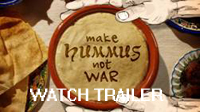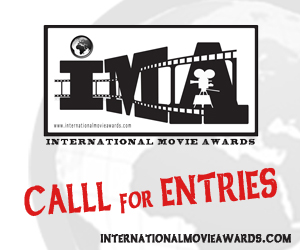|
Q: What was your overall role?
Writer, co-producer & director. The original idea was mine too.
Q: Did you always want to be in the film Industry?
From the age of 16 I became very interested in films particularly
European cinema. However I didn�t study film and didn�t commence
making my first film until I was 29 Q: Tell us how MHNW evolved.
Make Hummus Not War started in October 2008 when I read an article
in the Sydney Morning Herald by Jerusalem correspondent Jason
Koutsoukis about the importance of hummus in Israel.
I began surfing the internet and I discovered the �Hummus War� the
intense rivalry between Israel and Lebanon over the origins of
hummus. It then took me nearly another year to research and write
the original treatment and another 6 months to raise the finance,
followed by another 6 months of production and post production.
Q: Did you have any unusual difficulties during filming?
A funny thing happened on the way to Nablus, in the West Bank.
I went to Nablus with the husband of my Palestinian fixer. Khadar
knows Nablus well and is a bit of an expert on everything Nablian.
Nice guy too. We had some great discussions on the way about
identity, hummus and politics.
Anyway Nablus is in Area C security zone in the Occupied West Bank.
IE you need special permission to go there and or an Israeli GPO
press card which I didn�t have. So we get to the security check
point this morning and the soldier who checks the car won�t let me
through. Khader has a GPO card, so he is fine. But my international
journalist�s ID card is not enough. Khader argues the point, �He�s
an Australian, he has a press card let him through. I have a GPO
card, so what�s the difference?� Absolutely no go with the soldier.
I thought we were sunk. There goes the trip to the tahina factory
I�d lined up months ago. Nablus produces the best tahina in the
world. But Khader keeps on insisting, so much so, that another
soldier with higher rank comes over to ask what is going on. Khader
explains the situation. And then to make light of it all he says,
�This guy is an Australian film director, he�s making a film called,
Make Hummus Not War�. At which point the soldiers start pissing
themselves and instantly become very friendly. I ask them, �Do you
like your hummus?� And they waved us through with a smile and the
advice, �Well make sure you make hummus not war!� I wish I�d filmed
it as it was so funny. I started using the title much more in the
filming process, because it got good reactions. Q: Will winning awards help promote the film? How so?
Yes screenings at festivals and winning awards does help to raise
the profile of the film in the international festival market.
Q: How long did it take to make the film?
The production and post production took 6 months. But this was after
1years of research and writing and 6 months o raising finance. Q: Where were the locations?
Israel, Lebanon, Palestine, UK, USA , Australia Q: To what audience is MHNW suited?
Festivals and cinema, but there is a TV version too. A briad
audience interested in politics, history and food, particularly
regarding the Middle East. Q: Any bites yet from distributors?
Yes the feature length and TV version are both distributed
internationally (Off the Fence) and nationally in Australia
(Antidote Films). They were both part of the finance package. Q: What was it like working with various sources? How did you go
about choosing who to interview?
I like working in different cultures and languages apart from my
own. I selected interviewees after doing intensive research. I was
looking for characters with a sense of humor and who were
passionate about hummus. Q: What has the feedback been so far?
Very good, particularly with audiences in Europe. But interestingly
the film has won awards in China and Indonesia. I�m very
appreciative of the Indonesian awards. I think it�s very special
that a film ultimately about Middle East peace has won a Gold Peace
Award from a festival in the largest Muslim country in the world. I
think this very significant and I�m very happy about it. It shows a
strong international perspective o the part of the festival judges.
Q: Are you working on any new projects?
Yes several for Australian TV about religious pilgrimages like the
pilgrimage to The Hajj.
Q: Tell us about your own background. Where you were born? Where did
you study film? What was your first movie? What was your previous
job? Are you a full-time filmmaker?
I was born in Melbourne Australia. I did not go to film school but
attended a leading Australian art school. Ironically I ended up
teaching at the national film school in Australia as the Head of
Documentary. My first film was a documentary called Red Matildas a
film about 3 Australian women who were communists in the 1930s in
Australia and one of them went to fight in the Spanish Civil War. I
am currently a fulltime producer/director, but I have worked for SBS
TV in Australia, the ABC and at the national film school, AFTRS.
Q: what was your first award? And how did you feel at that time?
My first award was for Red Matildas at the Melbourne International
Film Festival in 1985. It was the prize of Best Australian film at
MIFF and an honor to receive it for our first film. Q: What was the best part of the project?

Eating the hummus at all the places we filmed at. Meting the hummus
makers of al nationalities and meeting Middle East food writer
extraordinaire, Claudia Roden. Q: What was the most challenging?
Working on a very tight schedule that covered the USA, Israel,
Palestine, Lebanon and the UK. Q: Are you pleased with the overall outcome?
Yes particularly the film�s success at festivals and their
audiences. Everywhere it has screened to sell out audiences. Q: What are your hopes and dreams for the film?
I want to create a Make Hummus Not War, hummus label that sells in
supermarkets around the world. I�m open to offers! Q: What makes you a filmmaker?
The need to communicate. I like the magic of cinema and
storytelling, captivating audiences, hopefully. Q: Why is this subject important to you?
I like the politics, history & food angle. And there is a strong
personal angle too, originally to do with my father and family life
that is evident in the film. This personal angle was s strong
motivation to make the film. It�s a tasty subject. Q: Does this film send the message you intended?
Yes, make hummus not war! Hummus and chickpeas are a symbol of our
common humanity. I wanted this movie to say �We have more in common
than divides us� Q: Do most people just turn a blind eye when they hear of these
issues?
I think so. Because we constantly hear bad news about the conflict
between, Israelis, Palestinians and Lebanese. But this film has a
different message. Q: Why the title?
The title is obviously a derivative of Make Love Not War, an
international peace slogan from the Vietnam War. Being an old anti
war activist I have always liked that slogan and I thought Make
Humus Not War was a great and funny adaptation of it. I wanted a
catchy title that was humorous. Q: Advice to others who might like to follow in your footsteps?
Documentaries can be too serious. Funny approaches to serious
subjects can help audiences with difficult subjects. Q: is there anything in the past happened to you, that make you make
this movie? If, yes, what is this?
Kitchens are more than just a
place for preparing and consuming food. They are the heart of the
home, and the restaurant, a place of nourishment, sharing and
enjoyment for the body and soul. Make Hummus Not War is a call to
action, an acknowledgement of our common humanity - our basic need
to eat and enjoy life, a hope for peace. Q: Is this a film that young people, college or high school students
could benefit from?
Yes very much so. I have attached our study guide for Australian
schools (please feel free to quote from the Study Guide). The film
has made its way into a university course in the USA, in peace
studies. Q: Do you personally know anyone who inspires the movie?
No Q: Has the film won any other awards?
Yes a Golden Kapok Award at Guangzhou International Documentary
Festival 2012 Q: Anything new to date on the film?
The film screens at the San Sebastian International Film Festival in
September. This is the most renowned festival in the Spanish
speaking world. Q: Unique stories during the making of the film?
Already outlined the best story. Q: what sacrifices did you make to become a filmmaker?
Not really any. It�s a rewarding if often uncertain career. You ned
to learn to live with uncertainty particularly about founding. Q: How do you see yourself in the next 10 years?
Well I hope to continue making films like MHNW. But raising money,
no matter how many awards you win or how many successful films you
have made is always a crazy business. I always say it a miracle that
any film gets financed and made. |







